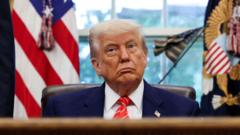
US President Defends Tariffs, Hints at Further Economic Measures
Washington, D.C. - In a recent address, the US President asserted that tariffs are "the most misunderstood thing" in the world of business, sparking considerable debate and apprehension among economists, trade organizations, and international partners. The President's remarks were coupled with a veiled threat of further economic actions, leaving many to speculate about the administration's future trade policies.
A Defense of Tariffs: Revenue Generation and Leverage
The President's core argument centered on the purported benefits of tariffs as a revenue-generating tool and a means of securing more favorable trade deals. He suggested that tariffs provide the US government with significant income, which can then be reinvested into domestic programs or used to reduce the national debt. Furthermore, he posited that the threat of tariffs, or their actual implementation, provides the United States with leverage in negotiations with other countries, compelling them to offer concessions on trade imbalances and other economic issues.
However, this perspective has been met with considerable skepticism from economists across the political spectrum. Critics argue that while tariffs do generate revenue, this revenue is ultimately paid by domestic consumers and businesses, who face higher prices on imported goods. This increased cost can then ripple through the economy, leading to inflation and reduced consumer spending.
Potential Impact on Key Industries
The President's comments have raised particular concerns within several key US industries, including:
- Agriculture: American farmers are heavily reliant on exports, and retaliatory tariffs imposed by other countries in response to US actions could significantly damage their bottom line.
- Manufacturing: Many US manufacturers rely on imported components and raw materials. Increased tariffs on these inputs would raise production costs and make them less competitive in the global market.
- Retail: Consumers would likely bear the brunt of higher prices on imported goods, potentially leading to reduced retail sales and economic slowdown.
The Global Response
The international community has reacted with caution and, in some cases, outright hostility to the President's pronouncements. Several countries have already retaliated with their own tariffs on US goods, escalating trade tensions and creating uncertainty in global markets. International organizations, such as the World Trade Organization (WTO), have expressed concerns about the potential for a full-blown trade war, which could have devastating consequences for the global economy.
Expert Analysis: A Closer Look at the Economic Implications
Economists are divided on the long-term effects of the President's trade policies. Some argue that tariffs can be a useful tool for addressing unfair trade practices and protecting domestic industries. Others contend that they are ultimately self-defeating, leading to higher prices, reduced trade, and slower economic growth.
A recent report by the Peterson Institute for International Economics concluded that the President's tariffs have already cost the US economy billions of dollars and led to a net loss of jobs. The report also warned that further escalation of trade tensions could push the US economy into recession.
Possible Future Actions
While the President did not specify what further economic actions he might take, several possibilities have been suggested:
- Expanding Tariffs to New Products: The administration could impose tariffs on a wider range of goods from countries deemed to be engaging in unfair trade practices.
- Imposing Quotas: The US could limit the quantity of certain goods that can be imported from specific countries.
- Strengthening Enforcement of Existing Trade Laws: The administration could increase its efforts to combat intellectual property theft and other forms of trade-related misconduct.
- Withdrawing from Trade Agreements: The US could withdraw from existing trade agreements, such as the North American Free Trade Agreement (NAFTA), if it believes that these agreements are not in its best interest.
The Road Ahead: Navigating Uncertainty
The President's comments have created a climate of uncertainty and apprehension within the business community. Companies are now faced with the difficult task of planning for the future in a world of rapidly changing trade policies. As the situation continues to evolve, it will be crucial for businesses to stay informed and adapt to the new realities of global trade.
```